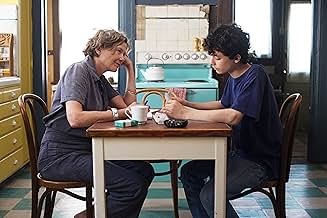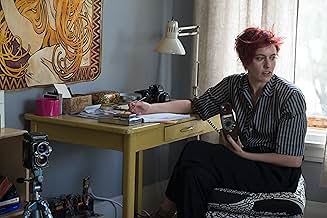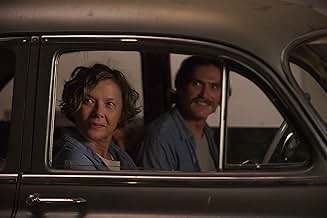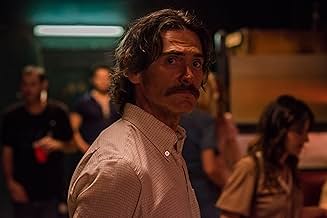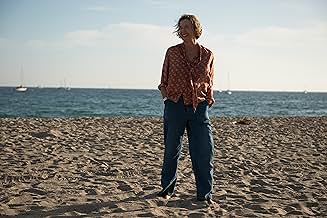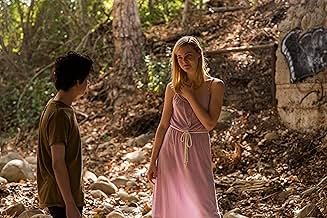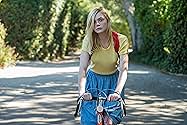La historia de un chico adolecente, su madre, y dos mujeres que ayudaron a criarlo entre el amor y la libertad de California del sur en los 70 y 80.La historia de un chico adolecente, su madre, y dos mujeres que ayudaron a criarlo entre el amor y la libertad de California del sur en los 70 y 80.La historia de un chico adolecente, su madre, y dos mujeres que ayudaron a criarlo entre el amor y la libertad de California del sur en los 70 y 80.
- Dirección
- Guionista
- Elenco
- Nominado a 1 premio Óscar
- 15 premios ganados y 82 nominaciones en total
Vitaly Andrew LeBeau
- Young Jamie Fields
- (as Vitaly A. Lebeau)
- Dirección
- Guionista
- Todo el elenco y el equipo
- Producción, taquilla y más en IMDbPro
Opiniones destacadas
The scene feels remarkably familiar – Dorothea (Bening), the matron and saint of a Santa Barbara household circa 1979 leans in on her son Jamie (Zumann) listening to "Fairytale in the Supermarket" by The Raincoats. "They know they sound terrible right?" she says. Abbie (Gerwig), Dorothea's avant-garde lodger interjects; "yeah, but it's like they don't care. They got all this feeling but don't have the tools they need to express it
it all comes out as passion." Dorothea fixates on Abbie's intonation, like listening to language she's only now grasping. She gets it...but then she doesn't.
Much like Abbie's defense of The Raincoats, Dorothea believes she has all the passion to be a proper mother, but she lacks the right tools to support a son who is growing older with each passing moment. She decides to enlist the help of two young women; Julie, Jamie's best friend and crush and Abbie a free spirit who was recently treated for cervical cancer. The only other man in the picture is William (Crudup) a well-meaning former hippie with a gift for mechanics and a passion for pottery. Between them all, the stalwart Dorothea hopes to quietly guide her son through his formative years which pit her depression era approach, to Jamie's recession era resentments. "Don't you need a man to raise another man?" asks Julie. "No I don't think you do." 20th Century Women starts with competing voice-overs and uses a collage approach to convey the surfaces of each character's inner life. The collages are stuffed to the brim with stills of 1930's gloom and 1960's turbulence all set to audio of proto-punk, Jimmy Carter's Malaise Speech and "As Life Goes By" from Casablanca (1942). It's an awkward mix; one that creates an echo chamber of sorts.
That subtle discordance of people talking at and not to each other, runs through the first half of the film. Jamie's coming-of-age story, a volatile mix of stubborn familial resentment and unrequited love clobbers together with Dorothea's own midlife crisis. "I had Jamie when I was 40." Dorothea says; a fact that can help explain Dorothea's free-range parenting approach, but also helps explain why Jamie's sharp insights cut so deep. For a while there it always seems like its Jamie versus Dorothea, pulled apart by an ever widening generational gap.
Then, like responding to the blessing of a wartime parlay, the factions in this film begin to center and calm. It is during this truce that the film begins to really take off, presenting its characters with vibrancy and humanity while flying through a more nuanced story arc. Almost independently both Jamie and Dorothea learn their goals are one in the same and the differences they have are little compared to their mutual respect for time which presents itself in rainbow tinged tracking shots and subtle fast-forwards.
And at the center of 20th Century Women lies the affable Annette Bening who suitably captures the zeitgeist of a generation no longer with us. While most might pigeonhole Dorothea as a madcap eccentric or worse a passive pushover, Bening wisely lets the character's inner strength shine through. Dorothea is unabashedly a one of a kind lady. She invites strangers to dinner, invites herself to punk clubs, leaves early, and then comes back days later alone. She verves uncomfortably with post-sexual revolution mores yet she quietly takes frank conversations about menstruation in stride. She does all this because she knows that with every encounter, every meeting, every stranger there's a chance for exchange.
Of course 20th Century Women is not without its problems. While Bening, Gerwig and Fanning all do wonders in their roles, Zumann fails to endear the young Jamie to the audience in any meaningful way. Part of it is due to the part as it is written. The film is loosely based on the life of director Mike Mills thus Jamie at times feels more like an avatar than a real teenager. Additionally it's ironic that despite constant paraphrasing of feminist literature, 20th Century Women would struggle to pass the Bechdel Test. Our three women characters orbit Jamie's life and analyze his actions and motives like he's the center of their universe.
Yet, while the film uses the wider Women's Liberation movement as window dressing, allowing the external conflicts of the film to melt away to reveal honest internal pain was a stroke of genius. Genius enough to maybe be interpreted as a meta-text on standard storytelling practices being a form of patriarchal oppression. That however is a discussion for another day. 20th Century Women is an artfully rendered film with plenty to say about the passage of time, the commonality between the generation gaps and the unifying love of mother and son.
Much like Abbie's defense of The Raincoats, Dorothea believes she has all the passion to be a proper mother, but she lacks the right tools to support a son who is growing older with each passing moment. She decides to enlist the help of two young women; Julie, Jamie's best friend and crush and Abbie a free spirit who was recently treated for cervical cancer. The only other man in the picture is William (Crudup) a well-meaning former hippie with a gift for mechanics and a passion for pottery. Between them all, the stalwart Dorothea hopes to quietly guide her son through his formative years which pit her depression era approach, to Jamie's recession era resentments. "Don't you need a man to raise another man?" asks Julie. "No I don't think you do." 20th Century Women starts with competing voice-overs and uses a collage approach to convey the surfaces of each character's inner life. The collages are stuffed to the brim with stills of 1930's gloom and 1960's turbulence all set to audio of proto-punk, Jimmy Carter's Malaise Speech and "As Life Goes By" from Casablanca (1942). It's an awkward mix; one that creates an echo chamber of sorts.
That subtle discordance of people talking at and not to each other, runs through the first half of the film. Jamie's coming-of-age story, a volatile mix of stubborn familial resentment and unrequited love clobbers together with Dorothea's own midlife crisis. "I had Jamie when I was 40." Dorothea says; a fact that can help explain Dorothea's free-range parenting approach, but also helps explain why Jamie's sharp insights cut so deep. For a while there it always seems like its Jamie versus Dorothea, pulled apart by an ever widening generational gap.
Then, like responding to the blessing of a wartime parlay, the factions in this film begin to center and calm. It is during this truce that the film begins to really take off, presenting its characters with vibrancy and humanity while flying through a more nuanced story arc. Almost independently both Jamie and Dorothea learn their goals are one in the same and the differences they have are little compared to their mutual respect for time which presents itself in rainbow tinged tracking shots and subtle fast-forwards.
And at the center of 20th Century Women lies the affable Annette Bening who suitably captures the zeitgeist of a generation no longer with us. While most might pigeonhole Dorothea as a madcap eccentric or worse a passive pushover, Bening wisely lets the character's inner strength shine through. Dorothea is unabashedly a one of a kind lady. She invites strangers to dinner, invites herself to punk clubs, leaves early, and then comes back days later alone. She verves uncomfortably with post-sexual revolution mores yet she quietly takes frank conversations about menstruation in stride. She does all this because she knows that with every encounter, every meeting, every stranger there's a chance for exchange.
Of course 20th Century Women is not without its problems. While Bening, Gerwig and Fanning all do wonders in their roles, Zumann fails to endear the young Jamie to the audience in any meaningful way. Part of it is due to the part as it is written. The film is loosely based on the life of director Mike Mills thus Jamie at times feels more like an avatar than a real teenager. Additionally it's ironic that despite constant paraphrasing of feminist literature, 20th Century Women would struggle to pass the Bechdel Test. Our three women characters orbit Jamie's life and analyze his actions and motives like he's the center of their universe.
Yet, while the film uses the wider Women's Liberation movement as window dressing, allowing the external conflicts of the film to melt away to reveal honest internal pain was a stroke of genius. Genius enough to maybe be interpreted as a meta-text on standard storytelling practices being a form of patriarchal oppression. That however is a discussion for another day. 20th Century Women is an artfully rendered film with plenty to say about the passage of time, the commonality between the generation gaps and the unifying love of mother and son.
"Guys aren't supposed to look like they're thinking about what they look like." Julie (Elle Fanning)
No they're not, but in Mike Mills' 20th Century Women, some rules don't apply, and the young man, Jamie (Lucas Jade Zumann), is well on his way to come of age in a most unusual household. It's 1979, before the Internet and Reagan and after the Punk rage. In other words, it's a time of cultural and personal transition.
No one is more responsible for this cultural migration in the Fields family than Dorothea (Annette Bening), a middle-aged matriarch with wit and lungs that will, in 20 years, surrender to the assault of her incessant smoking (her voice-over narration tells us so). Dorothea has the calm, contemplative, accepting nature to guide her two children, Jamie and Abbie (Greta Gerwig), into a responsible adulthood prefaced by sexual exploration and establishment defiance.
Although I rarely comment on acting, I must single out Bening for a performance of rich nuance, eschewing the theatrics of Oscar baiting to give us a character with immense affection and uncertainty, just like many of us, I suspect. Her low-key but powerful interpretation should get an Oscar nod.
While the examination of teen sexuality in flux is well described, so too is Dorothea's odyssey from a broken marriage to a Zen-like acceptance. As in the iconic Seinfeld world, nothing seems to be happening. However beneath that middle-class ambiance lie hearts struggling with their own shifting shapes under the watchful eye of family.
20th Century Women is all about the overwhelming part family plays in human development, not in grandly dramatic exercises but in the small notes like sitting in bed chatting or going with mother to a nightclub. As the credit sequence will tell you, life turns out fairly well despite the uncertainties of daily vicissitudes documented so distinctly here.
No they're not, but in Mike Mills' 20th Century Women, some rules don't apply, and the young man, Jamie (Lucas Jade Zumann), is well on his way to come of age in a most unusual household. It's 1979, before the Internet and Reagan and after the Punk rage. In other words, it's a time of cultural and personal transition.
No one is more responsible for this cultural migration in the Fields family than Dorothea (Annette Bening), a middle-aged matriarch with wit and lungs that will, in 20 years, surrender to the assault of her incessant smoking (her voice-over narration tells us so). Dorothea has the calm, contemplative, accepting nature to guide her two children, Jamie and Abbie (Greta Gerwig), into a responsible adulthood prefaced by sexual exploration and establishment defiance.
Although I rarely comment on acting, I must single out Bening for a performance of rich nuance, eschewing the theatrics of Oscar baiting to give us a character with immense affection and uncertainty, just like many of us, I suspect. Her low-key but powerful interpretation should get an Oscar nod.
While the examination of teen sexuality in flux is well described, so too is Dorothea's odyssey from a broken marriage to a Zen-like acceptance. As in the iconic Seinfeld world, nothing seems to be happening. However beneath that middle-class ambiance lie hearts struggling with their own shifting shapes under the watchful eye of family.
20th Century Women is all about the overwhelming part family plays in human development, not in grandly dramatic exercises but in the small notes like sitting in bed chatting or going with mother to a nightclub. As the credit sequence will tell you, life turns out fairly well despite the uncertainties of daily vicissitudes documented so distinctly here.
Elle Fanning uggh yes. Okay, now that that's out of the way lets get to this film. This seemed like an unconventional coming of age film and that is basically what this was. Its not a mindblowingly amazing film and has some flaws. However, what I thought was a flaw may have worked for another viewer. What I can say though, is that the film left a better impression on me than I thought it would.
The performances of this film are great, particularly that of Greta Gerwig and Annette Bening. Gerwig is such a real character who is pained but absolutely does what she wants to do in life. She has a hard time finding love but her very open nature makes her identifiable. Bening is tremendous in the best role I've seen from her. She's an easygoing mother who is worried about her son and how he deals with life. Remarkably cool but nuanced. Also, Elle Fanning good lord I love her. Okay, I had to get that out of my system again. All of the characters have substantial depth and you do not leave the film feeling like a character's story was underdeveloped. The main core of characters are all in close proximity with each other and through their interactions you get to see their turmoils, struggles, and comfortable nature with each other.
The stories of the characters of the film are at times told by themselves and they seem to be telling the story from a future time, where they have experienced the entirety of their lives. I liked this technique of expansive storytelling. However, there are other things in the film that don't work as well. The slideshow of images of the culture of the 70's seemed gimmicky and didn't exactly add to the film's narrative. It seemed like an attempt to be able to grab viewers but wasn't exactly necessary. There are also times where the scenes have a "psychedelic effect" where the car races off in the highway in a dreamy haze, full with the colors of the rainbow emanating from the car. Again, I thought this was quite gimmicky and trying to harden the fact that this film was supposed to be set in the 70s.
I think one of the things that worked with the film was its humor. There is a lot of it, and while its not always subtle and funny a good amount of it works to make you chuckle or really laugh. Its not something I was expecting but is definitely something that made the film more memorable. There are some scenes that really, really work and help you really want to live in the frame of the characters. The film really focuses on women at the time and a teenage boy trying to navigate in a sea of women in his life. While its not always accurate about men, I think its doing a pleasant job of trying to connect the two while showing some of the plights experienced when men and women try to understand each other. What you get here is a well acted, humorous films that works to entertain.
7/10
The performances of this film are great, particularly that of Greta Gerwig and Annette Bening. Gerwig is such a real character who is pained but absolutely does what she wants to do in life. She has a hard time finding love but her very open nature makes her identifiable. Bening is tremendous in the best role I've seen from her. She's an easygoing mother who is worried about her son and how he deals with life. Remarkably cool but nuanced. Also, Elle Fanning good lord I love her. Okay, I had to get that out of my system again. All of the characters have substantial depth and you do not leave the film feeling like a character's story was underdeveloped. The main core of characters are all in close proximity with each other and through their interactions you get to see their turmoils, struggles, and comfortable nature with each other.
The stories of the characters of the film are at times told by themselves and they seem to be telling the story from a future time, where they have experienced the entirety of their lives. I liked this technique of expansive storytelling. However, there are other things in the film that don't work as well. The slideshow of images of the culture of the 70's seemed gimmicky and didn't exactly add to the film's narrative. It seemed like an attempt to be able to grab viewers but wasn't exactly necessary. There are also times where the scenes have a "psychedelic effect" where the car races off in the highway in a dreamy haze, full with the colors of the rainbow emanating from the car. Again, I thought this was quite gimmicky and trying to harden the fact that this film was supposed to be set in the 70s.
I think one of the things that worked with the film was its humor. There is a lot of it, and while its not always subtle and funny a good amount of it works to make you chuckle or really laugh. Its not something I was expecting but is definitely something that made the film more memorable. There are some scenes that really, really work and help you really want to live in the frame of the characters. The film really focuses on women at the time and a teenage boy trying to navigate in a sea of women in his life. While its not always accurate about men, I think its doing a pleasant job of trying to connect the two while showing some of the plights experienced when men and women try to understand each other. What you get here is a well acted, humorous films that works to entertain.
7/10
"20th Century Women" (2016 release; 118 min.) brings the story of Dorothea, a divorced woman in her mid-50s, and her 15 yr. old son Jamie. As the movie opens, we are reminded it is "Santa Barbara, 1979", and Dorothea's car is engulfed in flames while she and Jamie were grocery shopping. When they finally get home, we also get to know Abbie, a 24 yr. old orange-haired photographer, and William, a Mr. fix-it-all, who both are renting rooms at Dorothea's house. Then there is Julie, the 17 yr. old who hangs out at the house for no apparent reason. When Dorothea feels she cannot handle the unruly(?) Jamie by herself, she enlists the help of Abbie and Julie. At this point we're 15 min. into the movie, but to tell you more of the plot would spoil your viewing experience, you'll just have to see for yourself how it all plays out.
Couple of comments: this is the long-awaited new movie from writer-director Mike Mills, who last surprised us with the outstanding "Beginners" (now already 6+ years ago). Here he brings a character study of a group of 5 people in the late 70s. This movie immediately connected with me, as I saw pieces of myself in "young" people: Abbie (Born 1955), Julie (born 1962) and Jamie (born 1964). I was born in 1960. The movie features an all-star ensemble cast, with an almost unrecognizable Great Gerwig as Abbie (and on the heels of another outstanding role in the recent "Jackie"), Elle Fanning in perhaps her best role to date as Julie, Billy Crudup as William, and newcomer Lucas Jade Zumann as Jamie. Surely we have not seen the last of him. But the biggest applause must go to Annette Bening, who brings perhaps the finest performance of her career as the well-intended but at times confused, sad and/or lonely Dorothea. Mills brings us these characters in rich detail and nuance, much to the viewing public's delight. Ever wonder what a "cool cigarette walk" is like? You'll find out in the movie. Music plays a ventral role in the movie. There is a fine original score (mostly electronic) by Roger Neill, but even better are the song placements (Talking Head, Black Flag, David Bowie, the Clash, and many others).
"20th Century Women" premiered to great acclaim at the New York Film Festival last Fall. The movie opened wide this weekend and I couldn't wait to see it. The Friday evening screening where I saw this at was attended nicely although by no means close to a sell-out. Doesn't matter. This is one of the finer movies of the year, for me anyway. If you like a richly-developed character study with an all-star ensemble cast, you cannot go wrong with this, be it in the theater, on VOD or eventually on DVD/Blu-ray. "20th Century Women" is HIGHLY RECOMMENDED!
Couple of comments: this is the long-awaited new movie from writer-director Mike Mills, who last surprised us with the outstanding "Beginners" (now already 6+ years ago). Here he brings a character study of a group of 5 people in the late 70s. This movie immediately connected with me, as I saw pieces of myself in "young" people: Abbie (Born 1955), Julie (born 1962) and Jamie (born 1964). I was born in 1960. The movie features an all-star ensemble cast, with an almost unrecognizable Great Gerwig as Abbie (and on the heels of another outstanding role in the recent "Jackie"), Elle Fanning in perhaps her best role to date as Julie, Billy Crudup as William, and newcomer Lucas Jade Zumann as Jamie. Surely we have not seen the last of him. But the biggest applause must go to Annette Bening, who brings perhaps the finest performance of her career as the well-intended but at times confused, sad and/or lonely Dorothea. Mills brings us these characters in rich detail and nuance, much to the viewing public's delight. Ever wonder what a "cool cigarette walk" is like? You'll find out in the movie. Music plays a ventral role in the movie. There is a fine original score (mostly electronic) by Roger Neill, but even better are the song placements (Talking Head, Black Flag, David Bowie, the Clash, and many others).
"20th Century Women" premiered to great acclaim at the New York Film Festival last Fall. The movie opened wide this weekend and I couldn't wait to see it. The Friday evening screening where I saw this at was attended nicely although by no means close to a sell-out. Doesn't matter. This is one of the finer movies of the year, for me anyway. If you like a richly-developed character study with an all-star ensemble cast, you cannot go wrong with this, be it in the theater, on VOD or eventually on DVD/Blu-ray. "20th Century Women" is HIGHLY RECOMMENDED!
Greetings again from the darkness. Writer/director Mike Mills has found a niche, and a form of therapy, by exploring and exposing his life in a most public manner
on the silver screen. Beginners (2010) brought us the story of his father's (an Oscar winner for Christopher Plummer) late life pronouncement of homosexuality. This time, Mr. Mills turns his lens and his pen towards his mother, and he seems to understand her much better in retrospect than in the summer of 1979 when the film is set.
This can be viewed as the story of three women, masked as a coming-of-age story for a teenage boy. Annette Bening stars as Dorothea, a chain-smoking single mother in her mid-50's who seems to have surrendered to her own sadness and loneliness, while simultaneously trying to make sense of a changing world. One of her tenants is Abbie (Greta Gerwig), a photographer and NYC punk scene drop-out, who is now battling cervical cancer. The third female is the seemingly always present Julie (Elle Fanning), a sexually promiscuous and borderline depressive 18 year old who values the platonic friendship she has with Dorothea's 15 year old son Jamie (Lucas Jade Zuman).
Factor in another tenant in the form of laid-back handyman and former hippie William (Billy Crudup), and we have a makeshift family in a communal setting that seems almost normal for 1979 Santa Barbara. Dorothea enlists the other two women to show Jamie their lives – the intent being to influence his growth in ways an older mother can't. Of course, Jamie is at the age where exploring life isn't necessarily best served by tagging along on a trip to the gynecologist with Abbie or having no-touch sleepovers with Julie.
Ms. Bening finds her groove as the story progresses and we feel her struggling to connect to each of the characters. When William plays a Black Flag song, her reaction is priceless: "They know they're not good, right?" She doesn't mean it as a put down, but rather her attempt to understand why her son is drawn to this. An even more emotionally naked moment occurs when Jamie is reading a passage from "The Feminine Mystique" to his mother. It's a passage that captures what he thinks of her, as well as what she thinks of herself a mostly invisible woman finding it difficult to be a parent while also maintaining a self.
Mills is not one to be nostalgic or glorify the past. His brilliant writing includes lines like "Wondering if you are happy is a great short cut to being depressed." The movie can be slow moving at times, but it's the best I've seen in awhile at expressing what makes us tick. The film is what Running with Scissors should have been. Real people are sometimes interesting, sometimes boring, and sometimes annoying. Each of the characters here are all of the above (just like you and me).
This can be viewed as the story of three women, masked as a coming-of-age story for a teenage boy. Annette Bening stars as Dorothea, a chain-smoking single mother in her mid-50's who seems to have surrendered to her own sadness and loneliness, while simultaneously trying to make sense of a changing world. One of her tenants is Abbie (Greta Gerwig), a photographer and NYC punk scene drop-out, who is now battling cervical cancer. The third female is the seemingly always present Julie (Elle Fanning), a sexually promiscuous and borderline depressive 18 year old who values the platonic friendship she has with Dorothea's 15 year old son Jamie (Lucas Jade Zuman).
Factor in another tenant in the form of laid-back handyman and former hippie William (Billy Crudup), and we have a makeshift family in a communal setting that seems almost normal for 1979 Santa Barbara. Dorothea enlists the other two women to show Jamie their lives – the intent being to influence his growth in ways an older mother can't. Of course, Jamie is at the age where exploring life isn't necessarily best served by tagging along on a trip to the gynecologist with Abbie or having no-touch sleepovers with Julie.
Ms. Bening finds her groove as the story progresses and we feel her struggling to connect to each of the characters. When William plays a Black Flag song, her reaction is priceless: "They know they're not good, right?" She doesn't mean it as a put down, but rather her attempt to understand why her son is drawn to this. An even more emotionally naked moment occurs when Jamie is reading a passage from "The Feminine Mystique" to his mother. It's a passage that captures what he thinks of her, as well as what she thinks of herself a mostly invisible woman finding it difficult to be a parent while also maintaining a self.
Mills is not one to be nostalgic or glorify the past. His brilliant writing includes lines like "Wondering if you are happy is a great short cut to being depressed." The movie can be slow moving at times, but it's the best I've seen in awhile at expressing what makes us tick. The film is what Running with Scissors should have been. Real people are sometimes interesting, sometimes boring, and sometimes annoying. Each of the characters here are all of the above (just like you and me).
¿Sabías que…?
- TriviaDuring rehearsals, the cast was encouraged to bring in music they believed their characters listened to. Then, to encourage familiarity among the cast, there would be a dance party where the only rule was that everyone had to dance and it didn't matter what the song was.
- ErroresDorothea is variously depicted discussing her stock portfolio with her son Jamie, quoting NYSE share prices in decimals, doing this in 1979. However, the switch to decimal from fractional stock prices in the U.S. did not occur until the year 2000.
- ConexionesFeatured in WatchMojo: Top 10 Movies of 2016 Already Getting Oscar Buzz (2016)
- Bandas sonorasDon't Worry About the Government
Written by David Byrne
Performed by Talking Heads
Courtesy of Sire Records
By arrangement with Warner Music Group Film & TV Licensing
Selecciones populares
Inicia sesión para calificar y agrega a la lista de videos para obtener recomendaciones personalizadas
- How long is 20th Century Women?Con tecnología de Alexa
Detalles
- Fecha de lanzamiento
- País de origen
- Sitios oficiales
- Idioma
- También se conoce como
- 20th Century Women
- Locaciones de filmación
- East Beach, Santa Bárbara, California, Estados Unidos(Santa Barbara, CA)
- Productoras
- Ver más créditos de la compañía en IMDbPro
Taquilla
- Presupuesto
- USD 7,000,000 (estimado)
- Total en EE. UU. y Canadá
- USD 5,664,764
- Fin de semana de estreno en EE. UU. y Canadá
- USD 111,200
- 1 ene 2017
- Total a nivel mundial
- USD 7,214,806
- Tiempo de ejecución1 hora 59 minutos
- Color
- Mezcla de sonido
- Relación de aspecto
- 2.00 : 1
Contribuir a esta página
Sugiere una edición o agrega el contenido que falta

Principales brechas de datos
What is the streaming release date of Mujeres del siglo XX (2016) in Canada?
Responda






